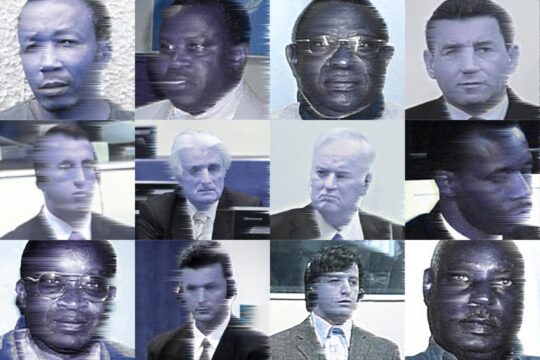(Dakar, Senegal) -- “To the victims I ask for forgiveness. I know it’s not sufficient, but I ask for forgiveness.” Bandjim Bandoum, once a top political police agent of the former Chadian dictator, Hissène Habré, had waited 25 years to unburden himself. Then he turned to Habré, sitting a few feet away, and said, “I have lived up to my responsibility, now it is time for you to live up to yours.” Habré remained silent, his face covered up in a turban and sunglasses.
The scene took place last month in the Extraordinary African Chambers, an innovative Senegalese court established in 2013 with African Union support. Habré, brought to power in landlocked Chad by Ronald Reagan in 1982 as a bulwark against the expansionist designs of Libya’s Muammar Qaddafi, is accused of thousands of political killings and systematic torture before he was overthrown and fled across the continent here to Senegal in 1990.
Habré’s trial, now in week eight, has produced new revelations. Last week, four women broke a 30-year silence to testify that they had been sent to the desert north of Chad in 1988 as sexual slaves for Habré’s army. One was 13 years old at the time. One of the women affirmed that Habré himself had also raped her. Witnesses described how corpses were kept rotting in jail. Forensic experts confirmed the existence of mass graves.
The presiding judge is from Burkina Faso, a veteran of the Rwanda war-crimes tribunal, who sits with two experienced Senegalese judges. The trial is streamed live and broadcast on national television back in Chad.
Hissène Habré has rejected the tribunal’s authority. After his lawyers failed to appear at the opening of the trial, the court appointed three lawyers to defend him and adjourned 45 days so they could prepare. The first day back, Habré was brought in kicking and screaming. But he has sat still ever since, his face almost completely covered, refusing to speak or even to look at the witnesses, many of them former friends. Only at the end of each court session does he raise him arms in a gesture of victory to his family and supporters, who clap as he is led out of court.
Perhaps the most remarkable aspect of the trial, though, has been the leading role of the Chadian victims, who kept pushing for 25 years, in the face of Senegal’s initial resistance to try Habré, until the court was established. A dozen are here for the whole trial, including Souleymane Guengueng, who rallied wary survivors and widows into an association after Habré’s fall. About 70 are being brought from Chad to testify, often displaying their satisfaction on the stand. Kaltouma Deffalah, one of the former sex slaves, told the court that she felt “very proud and strong to be here today telling my story when this man, who was once the dictator, is sitting there silently.” Habré’s official website called the women “whores” and “prostitutes.”
The victims’ lead lawyer, Jacqueline Moudeina, still has shrapnel in her leg from 2001, when one of Habré's security bosses, appointed police chief in the post-Habré government , had a grenade thrown at her. Representing 4,435 “civil parties” here, Maitre Moudeina’s team has an equal voice in the trial to the prosecution and the defense.
Another victim’s name has often been invoked here, Rose Lokissim. She kept notes in jail about the torture and killings there, before she was betrayed and herself murdered in 1986. In 2001, in an abandoned building in Chad’s capital, Ndjaména, I stumbled on to the files of Habré’s political police, including the report of Lokissim’s last interrogation. Her questioners wrote that Lokissim said that even if they killed her, “Chad will thank her and history will talk about her.” History is indeed talking about Lokissim, at least here.
A verdict is expected early next year. No matter how it turns out, this case has shown that survivors, with tenacity and perseverance, can bring their dictator to court, even in Africa.
Reed Brody, counsel with Human Rights Watch, has worked with Hissène Habré’s victims since 1999.





